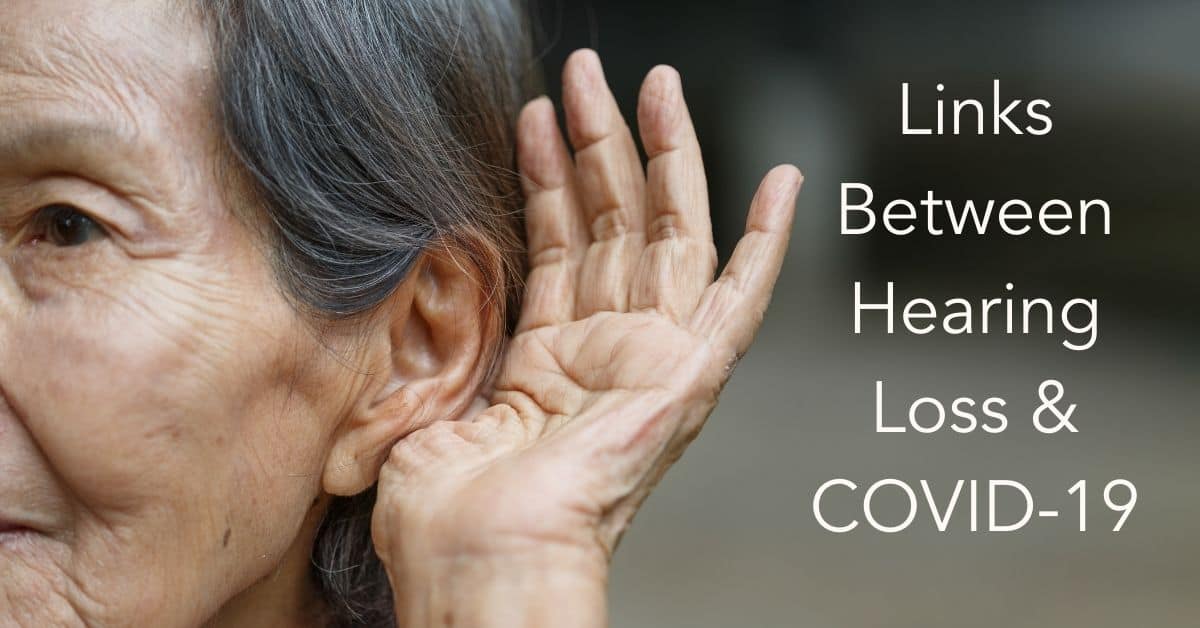
Have you been following the news about the COVID-19 pandemic? The coronavirus can be especially dangerous for older adults, so we recommend following your local guidelines to minimize your risk.
COVID-19 has already been linked to several long-term side effects. For example, some experts believe that COVID-19 can increase your risk of developing a heart condition, suffering from kidney problems, or having a higher risk of inflammation.
A new study also shows a link between hearing health, tinnitus, and COVID-19.
Hearing Health and COVID-19
A new study on hearing health and COVID-19 shows a link between COVID-19 and your ears. The study collected data from an online survey with over 3,000 participants. These participants, who were from North America and Europe, almost all had some level of tinnitus.
The researchers looked at how COVID-19 affects hearing health, and they discovered that COVID-19 can make tinnitus worse. The recent study shows that 40% of participants who had COVID-19 symptoms experienced worse tinnitus! This adds tinnitus to the long list of conditions that can be exacerbated by COVID-19.
What is Tinnitus?
Tinnitus affects millions of Americans of all ages. It’s especially common among older adults with age-related hearing loss, or younger adults with noise induced hearing loss. Tinnitus can also be an early warning sign of hearing loss.
Tinnitus is that ringing or buzzing sound you may hear when everything around you is very quiet. It’s a phantom sound that only you can hear, and it usually gets worse with stress, fatigue, and increased hearing loss. Tinnitus symptoms can sound like:
- Ringing
- Whooshing
- Buzzing
- Roaring
- Hissing
- Clicking
- Whistling
Tinnitus can be either loud or soft, and it can be at any pitch. It can be in one or both ears, and it can come and go throughout the day or the week. Tinnitus is different for everyone. Some people will experience tinnitus all the time, while others might only have tinnitus from time to time.
What’s the Link Between COVID-19 and Tinnitus?
The link between COVID-19 and tinnitus might actually have to do with stress. COVID-19 doesn’t directly affect your ears or cause tinnitus. However, COVID-19 can make you very stressed, and stress is closely linked to tinnitus. If you receive a COVID-19 diagnosis, you’re probably stressed by increased social distancing and worries about your health.
The Cycle of Stress and Tinnitus
Stress and tinnitus are part of a negative cycle. When you feel stressed by life events, external pressures, a health scare, or COVID-19, your tinnitus will get worse. In the same way, when your tinnitus is more noticeable, you’ll feel more stressed. And this elevated stress makes your tinnitus even worse!
Are You Stressed About COVID-19?
Many older adults are stressed about COVID-19. This could be from a recent diagnosis, or from all the pressures of social distancing. You may feel lonely, have a hard time sleeping, or feel anxious about talking to friends on the phone rather than in person. Are you stressed about COVID-19? This stress can increase your experience of tinnitus and lead to worse hearing health.
Reducing Stress
One of the best ways to reduce tinnitus is to reduce your experience of stress. You can’t get rid of the risk of COVID-19 right now, but you can take steps to manage your stress levels. Take some time every day to relax. Whether you read a book, take a bath, talk to a friend, or practice some deep breathing, find a way to relax each day.
Managing Tinnitus
If you have tinnitus, there are a few ways you can manage tinnitus and reduce your stress. Some people find relief from tinnitus when they play background music, turn on a fan, or use a white noise machine.
You can also manage tinnitus with hearing aids. Many of our top performing hearing aids have built-in tinnitus therapy programs that will reduce your experience of tinnitus. These programs are calibrated to match your tinnitus, and they’ll play sounds to mask your tinnitus. You’ll be able to enjoy your day without worrying about tinnitus. This lowers your stress and will make your tinnitus even less noticeable!
